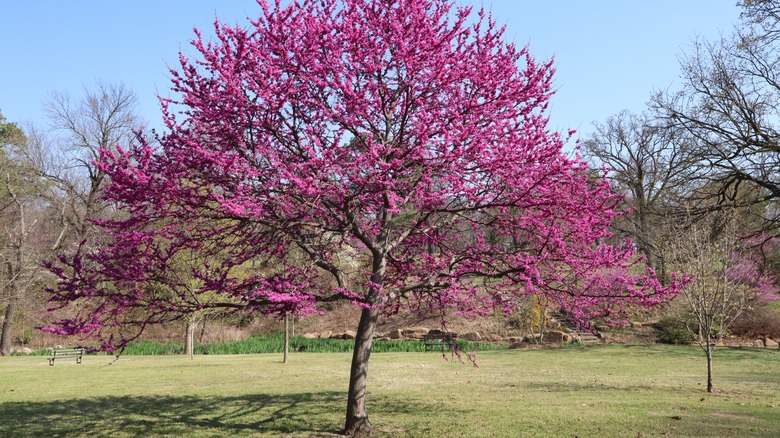Be Wary Of The Pink Trumpet Tree If You Have Pets Or Small Children
Pink trumpet trees make a stunning and colorful statement in yards and streets, especially when they bloom. Their pink, trumpet-shaped flowers make any yard look like a dream. But –- and this is a big but –- if you have pets or small children, you might want to think twice before planting one of these beauties in your space.
As lovely as they look, the pink trumpet tree is actually toxic. Both the flowers and the bark contain chemicals like alkaloids, which can be harmful if ingested. If your dog or cat chews on the bark or flowers, they could end up with symptoms like nausea, vomiting, or diarrhea. In more severe cases, it could even lead to respiratory issues or worse. And pets (especially puppies and kittens) will chew on anything, right? The same goes for small children. They're naturally curious and often put random things in their mouths while playing. Even touching the sap of the tree could cause skin irritation or allergic reactions.
Another thing to keep in mind is that this tree can be invasive depending on where you live. While native to Central and South America, the pink trumpet tree has been introduced to other parts of the world, like the southern U.S. and tropical parts of Asia. In areas where the climate is similar to its native habitat, it can grow fast and start spreading, which can lead to it taking over and crowding out local plants. It's not considered invasive everywhere, but it's definitely something to check with your local gardening center or environmental regulations.
Safer alternatives to the pink trumpet tree
If you're on the fence about the pink trumpet tree because of its toxicity or invasive potential, there's no need to stress. There are many safer alternatives that are just as beautiful and won't pose a risk to your family, pets, or local ecosystem. First up is the eastern redbud (Cercis canadensis). This tree blooms with beautiful pink or purple flowers in early spring and is non-toxic, making it an ideal choice for homes with kids and pets. It is also well-suited to a range of growing conditions, so whether you have full sun or partial shade, it'll thrive. And because it's a native species, it's less likely to become invasive, which is another big win.
The next is serviceberry (Amelanchier spp.), a much safer alternative to the pink trumpet tree, especially for households with pets or small children. Unlike the pink trumpet tree, the serviceberry is completely non-toxic. Its berries are not only safe but edible for humans and wildlife, making it a great choice for pet- and child-friendly landscapes. Additionally, the serviceberry attracts birds to your garden, as well as other wildlife, with its sweet berries without posing any danger to domestic animals.
The serviceberry is also low maintenance, with a non-invasive root system that won't outcompete native plants, unlike the pink trumpet tree, which can be invasive in certain climates and disrupt local ecosystems. Opting for the serviceberry ensures you'll have a beautiful, ornamental tree that is safe and environmentally responsible.

